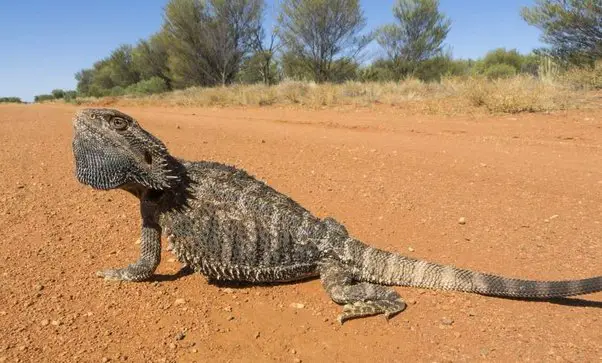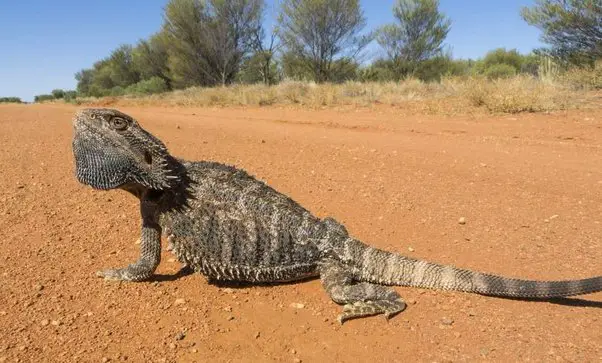Bearded dragons are fascinating creatures, adored by many reptile enthusiasts. These animals are known for their unique appearance and docile nature, making them popular pets. But have you ever wondered how well bearded dragons can see?
This question has been a topic of debate among reptile experts for years. Some believe that bearded dragons have exceptional eyesight, while others argue that their vision is limited. In this article, we’ll explore the fascinating world of bearded dragon vision and uncover the truth about their eyesight.
Bearded dragons have excellent eyesight and are able to see colors, shapes, and movement very well. They have a third eye, called a parietal eye, on the top of their head that can detect changes in light and dark. They also have a wide field of vision, allowing them to see predators from all angles. Overall, bearded dragons have exceptional vision that helps them survive in the wild and makes them great pets.

How Well Can Bearded Dragons See?
Bearded dragons are fascinating creatures and have become popular pets around the world. They are known for their docile nature, unique appearance, and impressive behaviors. One of the most interesting aspects of bearded dragons is their vision. But, how well can bearded dragons see? In this article, we will explore the different aspects of bearded dragon vision and what it means for these incredible reptiles.
Visual Range
Bearded dragons have a relatively good visual range. They can see objects from a distance of up to 10 meters away. They have a unique ability to track and follow moving objects, making them excellent hunters in the wild. Their eyes are located on the sides of their head, giving them a wide field of vision of almost 180 degrees. However, they have a blind spot directly in front of them, so they rely on their other senses to navigate close objects.
Bearded dragons also have the ability to see in both bright and dim lighting conditions. They have a specialized pupil that can contract or dilate to adjust to the amount of light entering their eyes. This means they can see well in bright sunlight, as well as in low light conditions, such as at dusk or dawn.
Color Vision
Bearded dragons have excellent color vision. They have four different types of color receptors in their eyes, which allows them to see a wide range of colors, including ultraviolet light. This is particularly important for them to identify prey, predators, and potential mates. They can differentiate between various shades of blue, green, red, and yellow, making their vision similar to that of humans.
However, it is important to note that bearded dragons see colors differently than humans. They see more vibrant and saturated colors than we do, but they cannot see shades of gray or brown. This is particularly important to keep in mind when choosing the colors of decorations and accessories in their enclosure.
Depth Perception
Bearded dragons have good depth perception, which is the ability to judge distances between objects. Their eyes are positioned on the sides of their head, which provides them with binocular vision. This means that they can use both eyes to focus on an object and create a three-dimensional image of their surroundings. This is important for them to accurately judge the distance between themselves and their prey or predators.
However, their depth perception is not as good as that of humans. This is because their eyes are not as close together as ours, which means that their brain has to work harder to merge the images from both eyes.
Visual Acuity
Bearded dragons have relatively good visual acuity, which is the ability to see fine details. They have a large number of cone cells in their eyes, which are responsible for sharp, detailed vision. This is important for them to accurately identify prey, predators, and potential mates.
However, their visual acuity is not as good as that of humans. This means that they may not be able to see small details on objects or read small text. It is important to keep this in mind when designing and decorating their enclosure.
Benefits of Good Vision
Having good vision is important for bearded dragons to survive in the wild. It allows them to track and catch prey, avoid predators, and find potential mates. Good vision is also important for their overall health and well-being. Bearded dragons that have poor vision may have difficulty finding food, mating, and may be more susceptible to injury and illness.
VS Other Reptiles
Compared to other reptiles, bearded dragons have excellent vision. They have a wider field of vision, better color vision, and more cone cells in their eyes. This makes them better hunters and more adept at navigating their environment.
For example, snakes have relatively poor vision and rely primarily on their sense of smell to identify prey and predators. Turtles and tortoises have a similar field of vision to bearded dragons, but they have less color vision and fewer cone cells in their eyes.
Conclusion
In conclusion, bearded dragons have excellent vision that allows them to thrive in the wild and in captivity. They have a wide visual range, good color vision, depth perception, and visual acuity. Good vision is important for their overall health and well-being, so it is important to provide them with an environment that supports their visual needs. Understanding how well bearded dragons can see is important for anyone who owns or cares for these incredible reptiles.
Frequently Asked Questions
Bearded dragons are fascinating creatures that are commonly kept as pets. One question that often arises is how well they can see. In this article, we will answer some of the most frequently asked questions about the vision of bearded dragons.
How do bearded dragons see?
Bearded dragons have relatively good vision compared to other reptiles. They have a binocular field of vision, which means they can see in front of them with both eyes. This helps them to hunt and navigate their environment. Bearded dragons also have a third eye, called the parietal eye, on the top of their heads. This eye is sensitive to light and can detect changes in the intensity of light, which helps the dragon to detect predators.
However, bearded dragons do not have color vision. They see in shades of gray, which is why they are not able to distinguish between different colors. They also have poor depth perception, which means they are not very good at judging distances.
Can bearded dragons see in the dark?
Bearded dragons are diurnal animals, which means they are active during the day and sleep at night. Although they have good vision during the day, they do not see very well in the dark. This is because they have fewer rods in their eyes compared to cones. Rods are the cells in the eye that are responsible for detecting light in low-light conditions. As a result, bearded dragons rely more on their sense of smell and their hearing at night.
If you want to observe your bearded dragon at night, it is recommended to provide a low-wattage red or blue light. This will allow you to see your dragon without disturbing its sleep cycle.
Can bearded dragons see through glass?
Bearded dragons can see through glass, but they may not recognize it as a barrier. This can be dangerous, as they may try to run into the glass and injure themselves. To prevent this, it is recommended to place a background on the back of the enclosure to help the dragon understand that there is a barrier there.
It is also important to note that bearded dragons can see their reflection in glass, which can cause them to become stressed or aggressive. If you notice your dragon reacting to its reflection, it is best to cover the sides of the enclosure with a dark-colored material to block the reflection.
Do bearded dragons have good eyesight?
Overall, bearded dragons have relatively good eyesight compared to other reptiles. They have a binocular field of vision, which helps them to hunt and navigate their environment. However, they do not have color vision and have poor depth perception. They also do not see very well in the dark. Despite these limitations, bearded dragons are able to adapt to their environment and thrive as pets with proper care and attention.
It is important to provide your bearded dragon with a proper enclosure and lighting to ensure that its vision is not compromised. Regular veterinary check-ups can also help to detect any vision problems early on.
What should I do if I suspect my bearded dragon has a vision problem?
If you suspect that your bearded dragon has a vision problem, it is important to take it to a veterinarian who specializes in reptiles. The vet will be able to perform a thorough examination and determine if there is an underlying issue. Some signs of a vision problem in bearded dragons include difficulty hunting, bumping into objects, or being hesitant to move around the enclosure.
Early detection and treatment of vision problems can help to prevent further complications and ensure that your bearded dragon lives a long and healthy life.
5 Senses of a Bearded Dragon & 30K GIVEAWAY!!
In conclusion, bearded dragons have a remarkable sense of sight. Their eyes are situated on the sides of their heads, which allows them to have a wide field of vision. They can see in color and have excellent depth perception, which helps them catch their prey and avoid predators. Additionally, they can perceive and respond to movements and changes in light, making them highly aware of their surroundings.
Overall, understanding how bearded dragons see is crucial for their well-being. Proper lighting and visual stimulation can help keep them healthy and happy. As owners, we can provide them with a stimulating and safe environment by ensuring they have access to different textures, colors, and objects to explore. By taking the time to understand our pets’ unique abilities, we can strengthen our bond with them and provide them with the best possible care.


